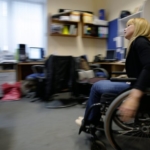When not to fix: Thoughts of an orthopaedic surgeon
One driving force that is emerging in our high-tech, low-touch approach to healthcare is our tendency to rely far too much on technology such as MRI findings, and too little on our physical exam findings and on the story our patient is telling us.

Reuters, Ralph Orlowski
By Howard Luks MD, Rheumatology Network July 22, 2013
A recent series of articles in USA Today is helping draw public attention to the issue of (unnecessary) surgery and to the fact that some recommendations for surgery are made before medically justifiable nonsurgical treatment is given a chance to succeed (or fail). The aforementioned series focuses on multiple subspecialties across the healthcare spectrum. As an orthopedist, I will focus on the issue as it relates to my own specialty.
There is sparse hard data on what drives the significant disparities that exist across the United States in terms of when surgery is recommended as a primary treatment modality. For example, we don’t know why Medicare patients in Nebraska are at least 3 times more likely to receive a knee replacement for management of their knee arthritis than are patients in Hawaii.[1]
One driving force that is emerging in our high-tech, low-touch approach to healthcare is our tendency to rely far too much on technology such as MRI findings, and too little on our physical exam findings and on the story our patient is telling us.
When it comes to treating patients with osteoarthritis and meniscus tears, rotator cuff tears, or numerous spine-related issues, a little bit of education and engagement can go a very long way. However, far too many patients choose to delegate all decision-making to us, their trusted physicians.
Researchers at Dartmouth University have studied the concept of informed or shared decision-making processes and its effect on the treatments that patients choose.[2] My own experience as a practicing orthopedic surgeon bears out the results that were documented by the Dartmouth researchers: Patients who are informed fully about the various risks and benefits of surgical and nonsurgical measures generally tend to opt for less-invasive procedures.
This begs a question: Are we treating these patients? Or are we treating their MRI findings?
A recent study in the New England Journal of Medicine has shown that patients with osteoarthritis and concomitant meniscal tears fare equally well after nonsurgical measures such as physical therapy as they do after arthroscopy.[3] An arthroscopy is not always a straightforward solution in this setting. It is not unusual for the arthritis to progress rapidly or for the distal femur to react by forming a stress reaction and subsequent condyle collapse, such as we see with osteonecrosis.
Many patients are under the unfortunate impression that if something is torn it must be fixed. Nearly all patients who are informed that they have a torn meniscus or a torn rotator cuff will immediately conclude that they need surgery to repair the problem. When patients are educated about the fact that many of these issues are simply secondary to age-related degeneration, and not necessarily a pathologic process that needs to be corrected surgically, not only do they relax and engage, but they are far more open to nonsurgical measures. Most would only consider surgery as an option if it had to be done to prevent the tear from “getting worse” – or if their physician thinks it is the right thing to do.
I have transformed numerous patients from second-opinion skeptics about nonsurgical measures to true champions of shared decision-making. When they are engaged and understand that they have options, they will typically come back after therapy, rest, or an injection and mention how happy and surprised they are that they did well without surgery.
It has been estimated that anywhere from 15% to 20% of knee replacements and arthroscopy for various orthopedic conditions are unnecessary.[4] I suspect that actually this number may be higher; however, the data is lacking.
A little effort – a little extra time spent engaging the patient in an active education process, and involving the patient as a team member in the shared decision-making process – can go a long way to minimizing the number of surgeries performed unnecessarily by the orthopedic profession.
Source Rheumatology Network
| References |
- TABLE 1. Numbers and unadjusted rates* of total knee replacement (TKR) among Medicare enrollees. In Racial disparities in total knee replacement among Medicare enrollees-United States, 2000-2006, Centers for Disease Control and Prevention (CDC). MMWR Morb Mortal Wkly Rep. 2009 Feb 20;58(6):133-8. Full text
- Informed patient choice: patient-centered valuing of surgical risks and benefits, Weinstein JN, Clay K, Morgan TS. Health Aff (Millwood). 2007 May-Jun;26(3):726-30. Full text
- Surgery versus physical therapy for a meniscal tear and osteoarthritis, Katz JN, Brophy RH, Chaisson CE, de Chaves L, Cole BJ, Dahm DL, Donnell-Fink LA, Guermazi A, Haas AK, Jones MH, Levy BA, Mandl LA, Martin SD, Marx RG, Miniaci A, Matava MJ, Palmisano J, Reinke EK, Richardson BE, Rome BN, Safran-Norton CE, Skoniecki DJ, Solomon DH, Smith MV, Spindler KP, Stuart MJ, Wright J, Wright RW, Losina E. N Engl J Med. 2013 May 2;368(18):1675-84. doi: 10.1056/NEJMoa1301408. Epub 2013 Mar 18. Erratum in: N Engl J Med. 2013 Aug 15;369(7):683. Full text
- Introducing decision aids at Group Health was linked to sharply lower hip and knee surgery rates and costs, Arterburn D, Wellman R, Westbrook E, Rutter C, Ross T, McCulloch D, Handley M, Jung C. Health Aff (Millwood). 2012 Sep;31(9):2094-104. doi: 10.1377/hlthaff.2011.0686.
Also see
Perceptions of Orthopaedic Surgeons Regarding Arthroscopic Surgery for Osteoarthritis of the Knee Medscape Multispecialty
Thumbs Down on Arthroscopic Knee Surgery Rheumatology Network
Professional Intuition Is Under Assault, Wachter Says Medscape Multispecialty
☞ Are a third of knee replacements inappropriate?
☞ Knee arthroscopy in arthritis: an evidence-practice mismatch
☞ Knee surgery shows no benefit for mild osteoarthritis






